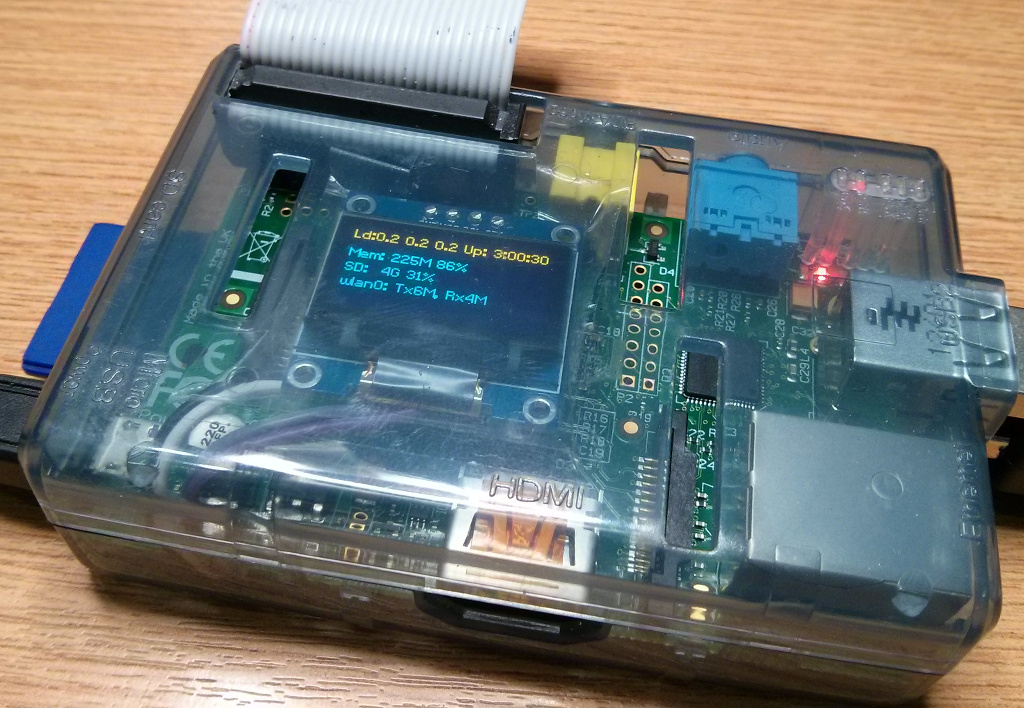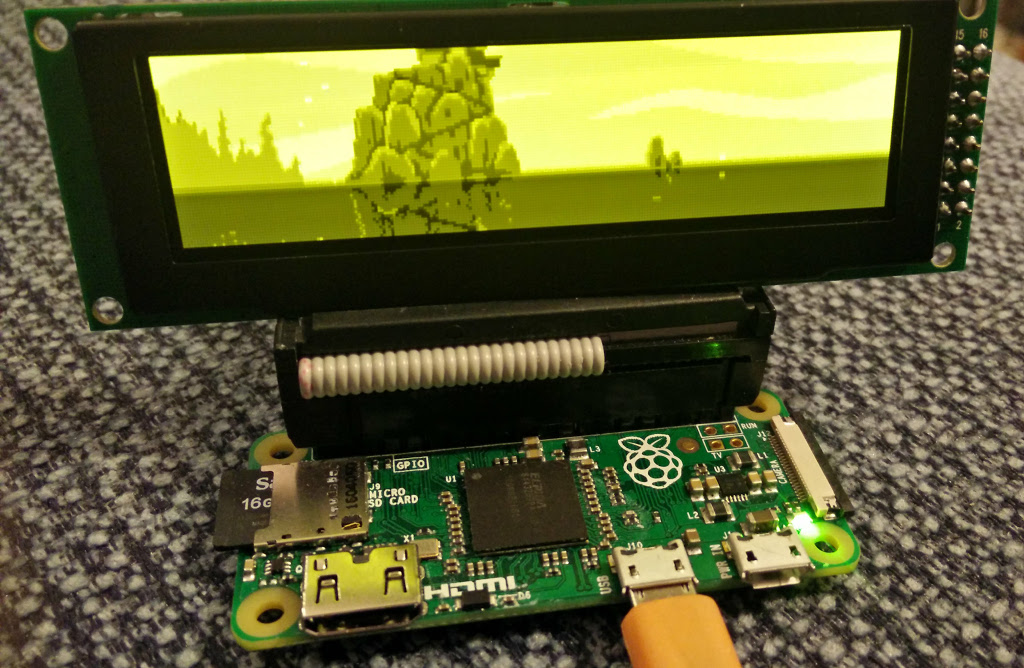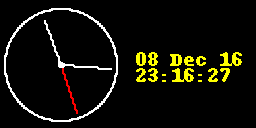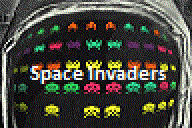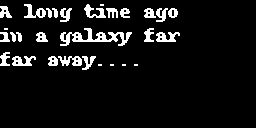- Forked from rm-hull/luma.oled <https://github.com/rm-hull/luma.oled> .
- Examples of Japanese font "misaki font" for OLED Display (1.3 inch / 128 x 64) included.
- Luma's work is highly versatile. Python 2 or 3, I2C or SPI, Raspberry Pi or Linux-based SBC.
- Read the great document at https://ssd1306.readthedocs.io/en/
sudo apt-get install libjpeg62-turbo-dev libjpeg-dev sudo -H pip3 install --upgrade luma.oled
misaki font is 8 x 8 Truetype font in almost in 7 x 7 area so that it has high readability in small space. http://littlelimit.net/misaki.htm
cd luma.examples/examples mkdir misakifont cd misakifont wget http://littlelimit.net/arc/misaki/misaki_ttf_2019-02-03a.zip unzip misaki_ttf_2019-02-03a.zip
git clone https://github.com/Naohiro2g/luma.examples.git cd luma.examples/examples # misaki font python3 crawl-misaki.py --interface spi # for SPI connection python3 crawl-misaki.py # for I2C connection # moving cube in 3D python3 3d_box.py --interface spi # space invaders! python3 invaders.py --interface spi # bouncing balls with FPS python3 bounce.py --interface spi # bench marking approx. 80FPS python3 perfloop.py --interface spi # see https://github.com/rm-hull/luma.oled/wiki/Usage-&-Benchmarking#096-spi-oled---ssd1306
| OLED Pin | Name | Remarks | RPi Function |
|---|---|---|---|
| 1 Brown | GND | Ground | GND |
| 2 Red | VCC | +3.3V Power | 3V3 |
| 3 Orange | D0 | Clock | GPIO 11 (SCLK) |
| 4 Yellow | D1 | MOSI | GPIO 10 (MOSI) |
| 5 Green | RST | Reset | GPIO 25 (*) |
| 6 Blue | DC | Data/Command | GPIO 24 (*) |
| 7 Purple | CS | Chip Select | GPIO 8 (CE0) |
*: exchangeable with any GPIO pins by command-line options below:
--bcm-reset 20 --bcm-data-command 21
Modified from [Hardware](https://github.com/Naohiro2g/luma.oled/blob/master/doc/hardware.rst)
| Left | BCM | BCM | Right |
|---|---|---|---|
| Red | 3.3 | 24 | Blue |
| Yellow | 10 | GND | Brown |
| --- | 9 | 25 | Green |
| Orange | 11 | 8 | Purple |
| OLED Pin | Name | Remarks | RPi Function |
|---|---|---|---|
| 4 Yellow | SDA | Data | GPIO 2 (SDA) |
| 3 Orange | SCL | Clock | GPIO 3 (SCL) |
| 2 Red | VCC | +3.3V Power | 3V3 |
| 1 Brown | GND | Ground | GND |
luma.core | luma.docs | luma.emulator | luma.examples | luma.lcd | luma.led_matrix | luma.oled
Display drivers for SSD1306 / SSD1309 / SSD1322 / SSD1325 / SSD1327 / SSD1331 / SSD1351 / SH1106


Python library interfacing OLED matrix displays with the SSD1306, SSD1309, SSD1322, SSD1325, SSD1327, SSD1331, SSD1351 or SH1106 driver using I2C/SPI on the Raspberry Pi and other linux-based single-board computers - it provides a Pillow-compatible drawing canvas, and other functionality to support:
- scrolling/panning capability,
- terminal-style printing,
- state management,
- color/greyscale (where supported),
- dithering to monochrome
Full documentation with installation instructions and examples can be found on https://luma-oled.readthedocs.io.
A list of tested devices can be found in the wiki.
The display pictured below is a SSD1306 (128 x 64 pixels), and the board is tiny enough to fit inside the RPi case.
As well as display drivers for various physical OLED devices, there are emulators that run in real-time (with pygame) and others that can take screenshots, or assemble animated GIFs, as per the examples below (source code for these is available in the luma.examples git repository:
Version 2.0.0 was released on 11 January 2017: this came with a rename of the github project from ssd1306 to luma.oled to reflect the changing nature of the codebase.
Some core functionality has been moved out to another git repository, luma.core: this has enabled another project to have a facelift: pcd8544 has now been reborn as luma.lcd: the same API can now be used across both projects. Likewise max7219 has been renamed to luma.led_matrix so it can also take advantage of the common API.
The consequence is that any existing code that uses the old ssd1306 package will need to be updated. The changes should be limited to altering import statements only, and are described in the upgrade documentation.
The MIT License (MIT)
Copyright (c) 2014-18 Richard Hull and contributors
Permission is hereby granted, free of charge, to any person obtaining a copy of this software and associated documentation files (the "Software"), to deal in the Software without restriction, including without limitation the rights to use, copy, modify, merge, publish, distribute, sublicense, and/or sell copies of the Software, and to permit persons to whom the Software is furnished to do so, subject to the following conditions:
The above copyright notice and this permission notice shall be included in all copies or substantial portions of the Software.
THE SOFTWARE IS PROVIDED "AS IS", WITHOUT WARRANTY OF ANY KIND, EXPRESS OR IMPLIED, INCLUDING BUT NOT LIMITED TO THE WARRANTIES OF MERCHANTABILITY, FITNESS FOR A PARTICULAR PURPOSE AND NONINFRINGEMENT. IN NO EVENT SHALL THE AUTHORS OR COPYRIGHT HOLDERS BE LIABLE FOR ANY CLAIM, DAMAGES OR OTHER LIABILITY, WHETHER IN AN ACTION OF CONTRACT, TORT OR OTHERWISE, ARISING FROM, OUT OF OR IN CONNECTION WITH THE SOFTWARE OR THE USE OR OTHER DEALINGS IN THE SOFTWARE.

